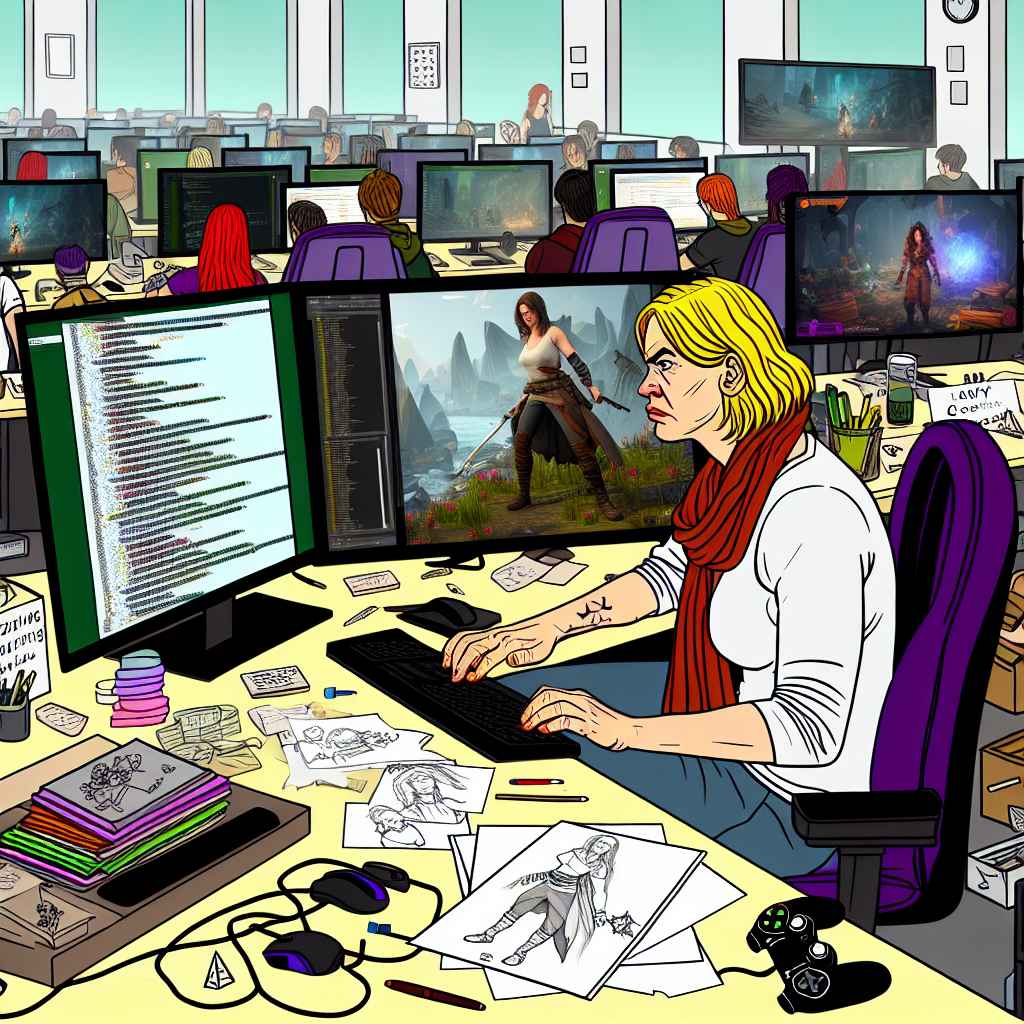Daily Tasks of a Video Game Developer
Video game developers play a crucial role in the gaming industry.
They create innovative and engaging games that entertain and inspire players.
This blog post will explore the daily tasks and responsibilities of a video game developer.
Let’s dive into a typical day in the life of a video game developer.
Morning Routine
The day typically starts early with a cup of coffee or tea.
Developers often review their tasks for the day.
They attend team meetings to discuss project progress.
Coding and Development
Coding and programming are main responsibilities of a game developer.
This involves writing, testing, and debugging code.
Developers work closely with designers to implement game mechanics.
Collaborating with Team Members
Teamwork is essential in game development.
Developers collaborate with artists, designers, and producers.
Communication is key as they solve problems and meet deadlines.
Playtesting and Feedback
After coding, developers engage in playtesting.
This helps identify bugs and gather feedback from testers.
This iterative process improves the game’s quality.
Iteration and Refinement
Game development is an iterative process.
Developers constantly refine and tweak their work.
This cycle continues until the game is polished for release.
Understanding Developer Work
The life of a video game developer is dynamic and challenging.
Transform Your Career Today
Unlock a personalized career strategy that drives real results. Get tailored advice and a roadmap designed just for you.
Start NowIt requires a mix of technical skills, creativity, and teamwork.
Understanding their daily tasks gives us deeper appreciation.
We can value the hard work that goes into creating games.
Morning Routine:
Video game developers usually start their day by checking emails for any important updates.
After that, they plan their tasks for the day, prioritizing based on deadlines and project requirements.
Team meetings are crucial for developers to discuss progress, roadblocks, and collaborate effectively.
Importance of Starting the Day Organized:
Starting the day organized helps developers stay on track and meet project milestones.
It allows them to focus on high-priority tasks and allocate time efficiently throughout the day.
Being organized also ensures clear communication with team members and avoids misunderstandings or delays.
Developers understand that a well-structured morning routine sets the tone for a productive day ahead.
By starting organized and focused, they can tackle complex tasks efficiently and contribute effectively to the overall success of the project.
Development Process:
Game development is a complex process that involves several stages.
Each stage requires creativity, technical skills, and collaboration to produce a successful video game.
Here are the different stages of the game development process:
1. Pre-Production:
During the pre-production stage, video game developers brainstorm ideas and create concepts for the game.
This is where the initial planning and design take place.
2. Concept Design:
Developers work on designing the characters, environments, and overall look of the game.
This stage is crucial in setting the visual style of the game.
3. Prototyping:
Once the concept design is finalized, developers create prototypes to test gameplay mechanics and features.
Showcase Your Business Today
Reach thousands of readers actively exploring professional services. Publish your business profile and grow your audience now.
Publish NowThis helps identify any potential issues early on.
4. Production:
In the production phase, developers start coding the game, creating animations, and designing levels.
This is where the game starts to come to life.
5. Testing and QA:
After production, the game undergoes testing and quality assurance to identify bugs and ensure the game runs smoothly.
This stage is crucial for a polished final product.
6. Deployment:
Once testing is complete, the game is ready for deployment.
Developers prepare for launch and make the game available to players on various platforms.
Throughout the game development process, video game developers play a crucial role in brainstorming ideas, coding, designing graphics, and testing the game.
Here is a breakdown of their responsibilities:
1. Brainstorming Ideas:
Developers collaborate with the team to come up with creative concepts and gameplay elements.
They pitch ideas and contribute to the overall vision of the game.
2. Coding:
Developers write code to bring the game to life.
They work closely with programmers to develop game mechanics, AI behavior, and other interactive elements.
3. Designing Graphics:
Developers create visual assets such as character models, animations, and environmental designs.
They focus on aesthetics and user experience to enhance gameplay.
4. Testing the Game:
Developers play a critical role in testing the game for bugs, glitches, and performance issues.
They provide feedback and work with the QA team to ensure a smooth gaming experience.
Collaboration and teamwork are essential in creating a video game.
Developers work closely with artists, designers, programmers, and other team members to bring their ideas to life.
Here are some key aspects of collaboration in game development:
1. Communication:
Developers need to communicate effectively with team members to ensure everyone is on the same page.
Clear communication helps streamline the development process.
2. Problem-Solving:
Developers collaborate to solve problems and overcome challenges during game development.
They brainstorm solutions and work together to implement them effectively.
3. Feedback and Iteration:
Developers give and receive feedback on game elements, making iterative improvements to gameplay, graphics, and mechanics.
This iterative process helps refine the game.
Find Out More: Cloud Solutions Architect: Pros and Cons
Challenges Faced:
Being a video game developer comes with its fair share of challenges.
Here are some common ones:
- Tight Deadlines: Meeting deadlines can be stressful, especially when unexpected obstacles arise.
- Technical Glitches: Bugs and technical issues can delay progress and frustrate developers.
- Creative Blocks: Finding inspiration and staying creative can be tough, leading to stagnant development.
Tips for Overcoming Challenges:
To overcome these challenges and stay motivated, developers can utilize the following strategies:
- Effective Time Management: Develop a realistic schedule and prioritize tasks to meet deadlines.
- Continuous Learning: Stay updated on the latest technologies and tools to troubleshoot technical glitches.
- Collaboration: Engage in brainstorming sessions with team members to overcome creative blocks.
- Take Breaks: Stepping away from work can help clear the mind and foster new ideas.
- Seek Feedback: Get input from peers and players to identify issues and improve the game.
By implementing these tips and strategies, video game developers can navigate challenges effectively and maintain their passion for creating engaging and innovative games.
Discover More: Certifications for Aspiring IT Compliance Officers
Creative Freedom
Video game developers have a high level of creative freedom to bring their visions to life.
They can express their creativity through intricate storylines that captivate players.
Characters in video games are often unique and imaginative, reflecting the developer’s creativity.
Gameplay mechanics are another avenue for developers to showcase their creativity and innovation.
Successful video games like “The Legend of Zelda: Breath of the Wild” demonstrate the creativity of developers.
The open-world nature of the game allows players to explore and interact with the environment freely.
The storyline is engaging and offers players multiple paths to complete their quests.
Characters like Link and Zelda are well-developed, each with their own personalities and motivations.
Showcase Your Business Today
Reach thousands of readers actively exploring professional services. Publish your business profile and grow your audience now.
Publish NowThe gameplay mechanics, such as the ability to climb almost any surface, add depth to the overall experience.
Another example of a creatively successful game is “Undertale,” known for its innovative gameplay and storytelling.
The game subverts traditional RPG mechanics, offering players choices that impact the storyline.
Characters like Sans and Papyrus are memorable and quirky, adding humor and charm to the game.
The gameplay mechanics include bullet-hell combat and puzzle-solving, adding variety to the experience.
Overall, video game developers have the freedom to create unique and immersive experiences that resonate with players.
Gain More Insights: Time Management Tips for IT Sales Specialists
Collaboration with Team Members:
- Working with a team is crucial for success in game development.
- Developers often collaborate with designers to bring game concepts to life.
- Artists play a key role in creating visually appealing graphics and animations.
- Testers help identify bugs and ensure gameplay is smooth and enjoyable.
- Project managers keep the team organized and on track to meet deadlines.
Importance of Collaboration:
Collaboration with team members is essential in video game development as it allows the different talents and perspectives of each team member to come together to create a cohesive and engaging gaming experience.
Without effective collaboration, a game could lack creativity, functionality, and overall quality.
Developers must work closely with designers, artists, testers, and project managers to ensure that all aspects of the game are in sync and working towards a common goal.
Working with Designers:
Designers are responsible for creating the overall look and feel of a game.
They work closely with developers to understand the technical limitations and possibilities of the game engine.
By collaborating with designers, developers can ensure that the gameplay mechanics align with the visual aesthetics of the game.
Communication between designers and developers is key to realizing the vision for the game and maintaining a consistent design throughout the development process.
Working with Artists:
Artists are instrumental in creating the visual assets that bring a game to life.
They work closely with developers to ensure that the art style and graphics complement the gameplay mechanics.
By collaborating with artists, developers can enhance the immersion and engagement of players.
Effective communication between artists and developers is essential to ensure that the visual elements of the game align with the game’s narrative and overall design.
Working with Testers:
Testers play a crucial role in ensuring the quality and playability of a game.
They work closely with developers to identify bugs, glitches, and other issues that may affect the player experience.
By collaborating with testers, developers can address and resolve issues before the game is released to the public.
Effective communication between testers and developers is essential to streamline the testing process and ensure that the final product meets quality standards.
Working with Project Managers:
Project managers oversee the development process and ensure that all tasks are completed on time and within budget.
They work closely with developers to establish priorities, allocate resources, and track progress.
By collaborating with project managers, developers can stay organized and focused on meeting project milestones.
Effective communication between project managers and developers is essential to ensure that the team remains aligned with the project goals and objectives.
Tips for Effective Communication and Teamwork:
- Establish clear goals and expectations with team members.
- Communicate regularly and openly with team members.
- Be open to feedback and suggestions from team members.
- Collaborate on problem-solving and decision-making processes.
- Respect the expertise and contributions of all team members.
Collaboration with team members is crucial for success in game development.
By working closely with designers, artists, testers, and project managers, developers can create high-quality, engaging games that resonate with players.
Effective communication and teamwork are essential to ensure that the creative vision for the game is realized and that the final product meets quality standards.
Find Out More: Top DevOps Conferences and Events

Technology and Tools:
Video game developers rely on a variety of technology and tools to bring their projects to life.
Here are some of the key components that they use on a daily basis:
Software Programs for Coding:
- Developers use programming languages like C++, Java, and Python to write the code that forms the backbone of a video game.
- Integrated Development Environments (IDEs) such as Visual Studio, Eclipse, and Xcode provide developers with tools to write, debug, and test their code.
- Version control systems like Git are essential for managing code changes and collaboration among team members.
Software Programs for Graphic Design:
- Graphic design software like Adobe Photoshop, Illustrator, and Blender are commonly used to create the visual elements of a game, such as characters, backgrounds, and animations.
- 3D modeling software such as Autodesk Maya and Autodesk 3ds Max allow developers to design and create 3D models for games.
- Animation tools like Unity and Unreal Engine help developers bring characters and environments to life through movement and interaction.
Software Programs for Project Management:
- Project management tools like Jira, Trello, and Asana help developers and teams stay organized, track progress, and manage tasks and deadlines efficiently.
- Communication tools such as Slack and Microsoft Teams facilitate collaboration and communication among team members, even if they are working remotely.
- Time tracking software like Harvest or Toggl can help developers keep track of the time spent on different tasks and projects.
Staying updated on the latest technology trends in the gaming industry is crucial for video game developers.
By keeping abreast of advancements in technology, developers can leverage new tools and techniques to create innovative and cutting-edge games.
Furthermore, staying informed about trends in technology and tools allows developers to improve their skills, adapt to changes in the industry, and remain competitive in the fast-paced world of game development.
Testing and Debugging:
Process of Testing and Debugging:
Testing involves running the game to identify bugs, errors, and glitches.
Debugging is the process of fixing these issues.
Identifying and Fixing Bugs:
Developers use tools like debuggers to track down bugs.
They analyze the code to find and resolve the issues.
Showcase Your Business Today
Reach thousands of readers actively exploring professional services. Publish your business profile and grow your audience now.
Publish NowBest Practices for Thorough Testing:
- Developers perform unit tests to check individual components.
- Integration testing ensures that different parts of the game work together.
- Regression testing confirms that new features do not disrupt existing functionality.
- Performance testing assesses how well the game runs under different conditions.
- User acceptance testing involves getting feedback from actual players.
- A/B testing compares different versions of the game to see which performs better.
- Automated testing helps streamline the testing process and catch issues early on.
By following these best practices, developers can ensure a high-quality final product that is free of major bugs and issues.
Work-Life Balance:
As a video game developer, maintaining a healthy work-life balance is crucial for overall well-being and productivity.
Here are some strategies to ensure you prioritize self-care:
Managing Stress:
- Practice mindfulness techniques like deep breathing or meditation.
- Take short breaks throughout the day to clear your mind.
- Exercise regularly to reduce stress and boost your mood.
Avoiding Burnout:
- Set realistic goals and manage your workload effectively.
- Delegate tasks when possible to lighten your workload.
- Know your limits and learn to say no when necessary.
Prioritizing Self-Care:
- Make time for activities you enjoy outside of work.
- Ensure you get enough sleep to recharge your mind and body.
- Eat a balanced diet to fuel your productivity and creativity.
Remember, taking care of yourself is not a luxury but a necessity to perform at your best as a video game developer.
Don’t hesitate to take breaks, set boundaries, and pursue hobbies outside of work.
Your mental and physical well-being are just as important as meeting project deadlines.
Daily Life of a Video Game Developer
After experiencing a typical day in the life of a video game developer, it is evident that their work is both challenging and rewarding.
The key points discussed include the rigorous coding, designing, and testing processes involved in creating video games.
We also touched on the importance of teamwork and collaboration within the development team.
Creative freedom and passion drive developers to craft innovative and engaging games.
Video game developers play a crucial role in shaping the gaming industry by pushing boundaries and exploring new technologies.
They deliver immersive gaming experiences to players worldwide.
Their dedication and hard work are essential in bringing our favorite games to life.
They keep us entertained for hours on end.
As gamers, we should take a moment to appreciate the talent and creativity that goes into making the video games we love.
By recognizing the efforts of video game developers, we can show our support for their hard work.
Let’s continue to celebrate and enjoy the fantastic games that these developers create for us.
Additional Resources
you found me. | game designer, author, future forecaster, PhD
Cybersecurity vs. Computer Science: A Look at Two Key Tech …




